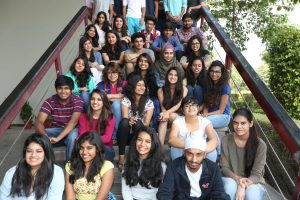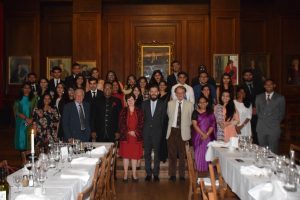The 21st century is an interesting time to be alive. We’re living in an age when the borders between countries may be riddled with tensions, but the boundaries between cultures, societies, economies, politics, ideas, identities, and so many other spheres are blurring. It’s an intriguing phenomena—this rapidly shrinking context in this vastly growing interconnectedness between the world.
The words ‘global’ or ‘globalisation’ have become as replete in our day-to-day conversations as they have in the current political, social and economic climate. Indeed, the world is more interconnected now, than ever before. The impact of globalisation is felt in every aspect of our lives today, from the very ways in which we live, speak, eat, dress, learn, or work, to the fabric of our societies, governments, markets and more.
These oft-studied phrases—’global’, ‘globalisation’, and its likes—jump off the pages of high school textbooks as our living realities. The world is changing. It’s shrinking, expanding and evolving, all at the same time. And these complex transformations are happening faster than ever before. The modern world holds a challenging prospect ahead for our younger generations. It will need new leaders, thinkers, and change-makers to step to the fore, to navigate the challenges and opportunities of a complex, interconnected world.
If you’re interested in the changing dynamics of politics, international affairs, the relationship between states, countries, organisations and people—a host of fascinating careers await you in our common global future.
The Jindal School of International Affairs (JSIA) offers a unique undergraduate programme suited to these domains—a B.A. (Hons.) in Global Affairs. The three-year course is a contemporary, cutting-edge exploration of all things global, ideal for those students who want to gain a deeper understanding of international affairs and pursue international careers.
The Global Affairs degree will help you prepare for international careers in ever-expanding streams like diplomacy, foreign policy, peace and conflict resolution, international justice, economic development, humanitarian relief and human rights, advocacy, politics, governance, political and economic analysis, journalism, news media, public relations, among others. From established areas to emerging arenas, the opportunities are galore for a Global Affairs graduate. As India gains a prominent spot in the international stage, the scope for growth and advancement in this field is vast.
So, if you’re passionate about making a difference and learning about the big issues facing us today, this is a course that could illuminate the way ahead for you.
What is Global Affairs? A Unique Undergraduate Degree
Usually, ‘International Relations’ or ‘International Affairs’ is an advanced subject available to post-graduate students. In the traditional progression, students with undergraduate degrees in social science subjects might choose to pursue these specialised areas for their higher studies. Yet as the times change, educational institutions are keeping pace with changing contemporary needs.
That said, there are only a handful of institutions in India that offer Bachelor’s level International Relations or Global Affairs programmes, and JSIA has carved a name for itself in this niche arena. Since 2015, JSIA has been making a basic knowledge of this increasingly intricate and exceedingly interesting discipline accessible to students fresh out of high school.
The B.A. (Hons.) in Global Affairs helps you gain a comprehensive understanding of world politics and international affairs. As India’s first such interdisciplinary undergraduate degree, it is one that prepares students for international careers through basic learning in world affairs.
In this globalised world, the study of global affairs encompasses a wide spectrum of themes. At its core, it deals with political science and its many facets in the global context. Considering the far-reaching linkages in a globalised world, however, this realm of study and practice is an interdisciplinary product of many related disciplines. So, you will be learning not just the subject of politics, but broadly those of history, sociology, economics and philosophy, as well. Within these areas, you will explore concepts of political thought, international political theory, international affairs, war, conflict and peace, poverty, justice, human rights, economic development, and so much more.
By dissecting and understanding global issues from these perspectives, a degree in Global Affairs will look closely at the evolving political dynamic of the past, present and future, the relationship between different countries and activities in the broader context of a changing world dynamic.
This presents a truly remarkable opportunity for young students—to combine various disciplines, gain a deeper understanding of the world, and foray into challenging, exciting careers across the globe.
The world needs more people with multidisciplinary training to analyse, evaluate and assess current world affairs while being well-versed with the skills and techniques to historically contextualising them, and envision a better future. Naturally, the very essence of the skills you stand to gain through this programme will open global opportunities.
Graduates of the Global Affairs programme can look forward to roles in government, foreign policy, diplomacy, Embassies, High Commissions, diplomatic missions, intergovernmental and non-governmental organisations like United Nations, social ventures, think tanks and research, business and finance, news media and journalism, corporates and international organisations, higher studies and academia, among others.
How exactly will the Global Affairs degree prepare you?
Learning from global faculty trained at the best of international universities
In today’s day and age, ‘information’ is at your fingertips. There’s a lot to learn and a lot of ways to learn. The reason we opt for higher education is to help us make sense of the knowledge the world has to offer, to build upon it, to learn from the wisdom of those who have much to share, to grow from the collective experiences of others who have pursued excellence in their lifetimes and careers, to adapt and adopt the many perspectives and ideas that different people or different disciplines have to offer. It is to gain a holistic understanding of a field of study, that we seek to delve deeper into learning.
Global Affairs is particularly the kind of area that is so deeply interconnected to a variety of concepts that it needs keen guidance to navigate, for a beginner. JSIA has pooled together an international faculty drawn from the world’s leading institutions, to help you on your journey of discovery, learning and growth.
Faculty and advisors with advanced degrees and experience play an involved role in students’ time at JSIA and beyond. Away from the traditional classroom setting, JSIA promotes efficient and effective faculty-student interaction, smaller classes, mentor-mentee programmes and extra tutorial sessions to support students in every way possible.
Through individual attention garnered by a comfortable faculty-student ratio of 1:9, the quality of such a student experience is hard to find in most traditional universities with hundreds of students in a single class. Tailor-made mentoring sessions with the faculty and the plethora of societies and clubs that a student can join, add impetus to personal growth.
Opportunities to study at top ranking institutions across the globe
What is global affairs without a global perspective? Global exposure in every sense awaits students at JSIA. You can benefit from meaningful collaborations with some of the top schools in international affairs from around the world, furthering your networks and developing an experiential understanding of different regions.
You may opt for a semester exchange, summer school, immersion programmes, and more, at leading institutions including: Indiana University’s School of Public and Environmental Affairs (SPEA), U.S.A.; School of International Service, American University, U.S.A.; Ryerson University, Canada; Faculty of Social Sciences, University of Wroclaw, Poland; Centre for European Studies, Katholieke Universiteit (KU), Leuven, Belgium; National Tsing Hua University, Taiwan; Kyung Hee University, South Korea; and Ritsumeikan Asia Pacific University, Japan.
Global Affairs students can also opt for summer schools at the prestigious likes of University of Oxford, U.K.; the University of Granada, Spain; and the Fletcher School at University of Tufts, U.S.A. There is also an option of studying at Geneva School of Diplomacy, Switzerland to earn a second Bachelor’s Degree in Global and International Studies.
Learn a different language
Dealing with global phenomena beyond the domestic arena, on the global stage, will inevitably entail communication with different parts of the world.
To give you an edge in international futures, the Global Affairs curriculum mandates the study of foreign languages. You can choose between German, Mandarin, French, Spanish, Arabic, Italian, and Persian/Dari. Knowing a foreign language also helps with better networking skills, facilitates communicating across levels of an organisation, between different actors in different regions, etc.
Roles at diplomatic missions, intergovernmental organisations such as the UN, embassies, consulates and so on would find great value in young professionals who are multilingual. India, as a multilingual country with a vast majority that is already bi-lingual, holds an immense potential to create resource pools of professionals in the area of global communications.
Strong focus on interdisciplinary research as the foundation of learning
One of the common underlying factors of leading universities the world over that have come to be coveted destinations for higher studies, is the opportunity for research. A university that engages in and encourages research—not just among students, but faculty as well—is clearly a cut above the rest. Bringing this culture of research to the Indian higher education space was one of the founding principles of O.P. Jindal Global University. Further, JSIA was established as an institution to nurture a generation of young researchers and scholars who are capable of contributing to a growing body of knowledge on areas of contemporary interest across the globe.
In the second year of the Global Affairs programme, students begin to grasp solid research and analytical skills so that they can start to take charge of the direction of their learning. In a place where passion and interest come first, students are encouraged to find and follow different areas of specialisation. Courses on Quantitative & Qualitative Analysis, Critical Reading & Academic Writing and Research Methods helps students develop a robust training.
You will have a chance to specialise in a field of knowledge chosen from several available options. Additionally, the opportunity to participate in cross-listed electives across the nine different schools at JGU can add depth and dimension to your interest area, or help diversify your interests. In the final year, you can take on Independent Research Study, Self-Study, and a Capstone Project to sharpen your research skills.
How does a multidisciplinary training and approach to research help in real life situations later on? In the globalised context of the positions you may one day hold, you will need to look at scenarios from different perspectives. Let’s consider the example of building a dam. While it is often seen a measure of economic prosperity or political accomplishment, offering hydroelectricity for the society, the decision to build a dam might trigger ecological consequences for the region and displacement of inhabitants. This would require an anthropological, environmental, political, economic, and psychological lens to understand the complete picture. If the river is a resource shared by two countries, then the action may also attract international repercussions. All these facets will require you to draw from and synthesise different perspectives, to arrive at the best, most viable solutions.
In this way, a multidisciplinary approach becomes vital to solving contemporary challenges. At JSIA, multidisciplinarity moulds well-rounded individuals and capable professionals.
Following a strong focus on research and academic writing, JSIA has established 12 faculty-led and student-driven thematic research centres focussed on different regions of the globe and key interdisciplinary interest areas.
Especially in the political domain, it is important to study comparative debates, and to analyse the past and the present, in order to speculate the moves of international counterparts, actors and activities in the future. A closer look at emerging international trends can give you a way to predict the future of global affairs. Only a comprehensive outlook of the dynamic variables at play will allow you to carry out methodological research and analysis—which is why the school emphasises on a multidisciplinary approach.
The leadership styles, methods of governance, economic policies, social constructs, among others, are all factors which differ from one region to another. However, the right research and comparative analysis allow room for reconciliation of policies to solve local and global issues. Students of the Global Studies programme will be prompted to gain in-depth understanding of different regions and international affairs through their research work, assignments, and international study opportunities.
Developing strong research skills in your undergraduate degree will also make you a strong candidate for higher studies in India or abroad, and will certainly open the doors to careers in academia or research.
Interfacing between academia and industry through internships & practical learnings
To prepare you for a plethora of career opportunities, JSIA will assist you in obtaining suitable internships according to individual areas of interest, both in India and abroad. JSIA offers unique opportunities to students by providing them international full-time internships abroad. For example, the Center for African Latin American and Caribbean Studies (CALACS) sent two students – Sanjana Medipally, BA. (Hons.) GA (2015 batch) & Aakanksha Lohia BA. (Hons.) GA (2016 batch) – to Brazil in 2017 on a fully funded field internship.
Keeping traditional learning as base, the innovative pedagogy shines through at JSIA. Experiential learning is facilitated via field trips, internships and initiatives in the 12 research centres. Analytical thinking and critical reasoning among students is enhanced through scenario building exercises, research papers and interactive learning sessions. You will be able to engage in regular public lecture series, seminars, symposiums and workshops that invite eminent scholars from around the world. Solution-oriented approaches bolsters the humanistic idea of public service. Such training creates wider perspectives and broadens the horizon of professional opportunities.
An education in Global Affairs requires a global institution. At O.P. Jindal Global University, the melting pot of cultures, ideas, knowledge and people creates an atmosphere ideal for academic and personal growth. Students learn to appreciate differences and celebrate diversity, eventually merging their minds and might in this complex, interconnected world of politics and beyond, to step into an exciting world of global opportunities.




